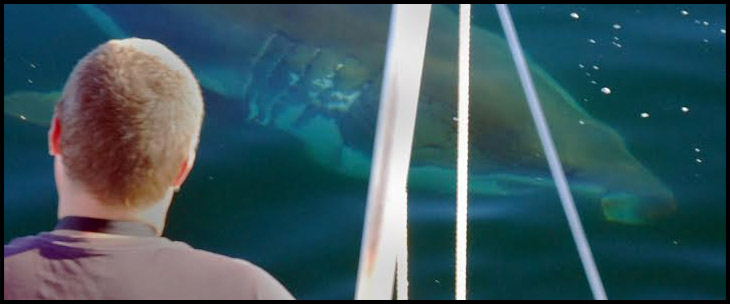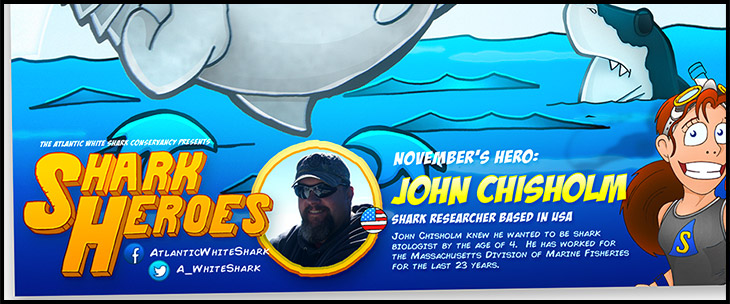If you were a shark, what would you be?
If I was a shark I guess I’d be an Oceanic White Tip (Carcharhinus longimanus). Besides the fact it’s my favorite species of shark, I think I’d enjoy a life away from civilization, wandering the open ocean.
Could you summarize what you do for research?
Our research focuses on the life history and ecology of shark species found off Massachusetts. At the moment I’m working with Dr Greg Skomal and PhD student Megan Winton on a white shark population study. My main contribution is identifying individual white sharks by their natural markings. In addition to that I’m working on assessing white shark behavior and movement through acoustic telemetry. I also maintain a database for white shark sightings in the Atlantic.
What does a typical field day look like?
A typical day in the field involves heading out on the research boat in search of white sharks off Cape Cod. The key to the operation is our spotter pilot, Wayne Davis. Once Wayne spots a shark he’ll direct the boat to the location and we’ll try and get video of the shark. It usually involves a lot of waiting for a few minutes of excitement. If the shark is cooperative we’ll also try to tag it but the main objective is to get video so we can identify individuals. For the most part though my typical day is not in the field, it is in the office or editing suite logging video and working on the database of individual sharks.
What inspired you to start doing this?
I’ve been fascinated with sharks my entire life and have several memorable moments from my childhood that helped inspire me. The New England Aquarium and the Shark Wall in particular were early influences. I can remember memorizing all the species of sharks on that wall and deciding that I would see them all someday. The documentary ‘Blue Water, White Death’ also helped fuel my passion at an early age. I dreamed of growing up to dive with and film sharks like Stan Waterman and Rodney Fox. It was the book ‘Shark! Unpredictable Killer of the Sea’ by Thomas Helm which first made me aware that there were actually people making a living studying sharks. In the book there was a photo of a man closely inspecting a shark with the caption “Here Dr. Perry W. Gilbert of Cornell University examines a freshly caught 500-pound mako.” Once I read more about “Shark expert Perry Gilbert” I knew what I wanted to do for a career. I wasn’t just going to dive with and film sharks, I was going to study sharks and learn their secrets!
Why do you think it’s important?
When it comes to the conservation of white sharks, or any species for that matter, it’s important to understand as much about their biology and ecology as possible. How many individuals are there in the population? What are their habitat preferences? Where and when do they reproduce? These are some of the questions we’re trying to answer with our work. What we discover will ultimately help policy makers take the appropriate steps to conserve white sharks in the Atlantic.
What is the hardest thing about doing this?
I think most researchers would agree that one of the hardest parts of the job is securing funding. Luckily for us the Atlantic White Shark Conservancy has helped fund the white shark study but for other projects we have to compete for grants and other sources of funding. Another big challenge is combating the misconceptions people have about sharks which continue to be perpetuated by some media outlets. Overall I’d say attitudes are changing but there are still many people who fear sharks.
What is the most rewarding thing about it?
By far the most rewarding thing for me personally is just being on the water in the presence of sharks. Professionally the most rewarding thing is making a new discovery and advancing what we know about sharks.
What if others want to help in shark conservation – how can they help?
There are plenty of ways people can contribute to shark conservation. One of the simplest things you can do to help is become a shark ambassador. Learn about sharks and shark conservation topics then spread the word! Even if it’s just telling your friends and family about what you’ve learned it will help start the conversation and hopefully they’ll pass on what they’ve learned. If you want to get a little more involved consider volunteering for a non-profit or other organization like an aquarium. You can also organize a fundraiser to support your favorite shark conservation group. There are lots of opportunities to help and thanks to social media it’s easier than ever to connect with like minded people.
Finally, do you have any advice for a young student wanting to study something like this? What would you tell them?
My favorite piece of advice to give students is – Don’t let school stand in the way of an education. I know this statement makes teachers cringe but I’m not saying you don’t need school, you definitely do! I’m just saying there are lots of skills that you can learn outside of the classroom that can be just as important as reading, writing and arithmetic. For example, learn to fish, learn to SCUBA dive, learn how to operate a boat or even better learn how to fix a boat engine. It’s often these real world experiences that will give you a leg up when you’re competing for a position with other students. I know everyone has their own path and my colleagues will undoubtedly have different recommendations but this is what has made the difference for me in my career.


































































































